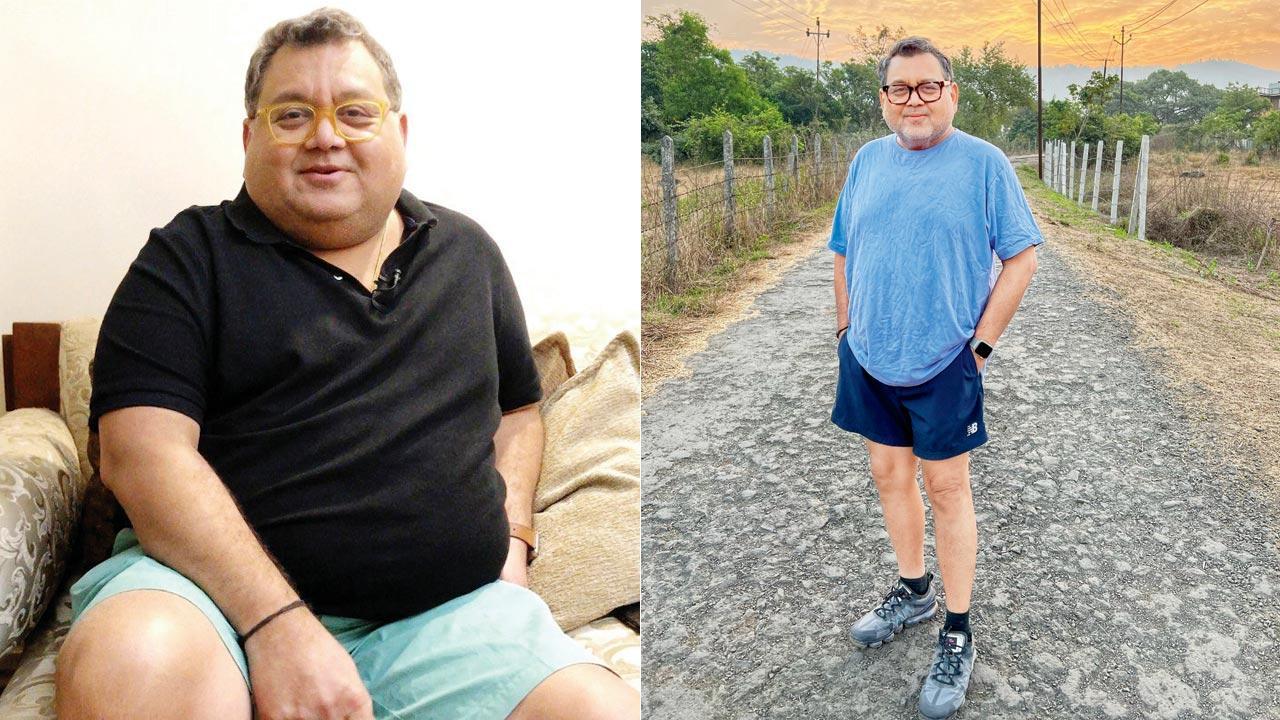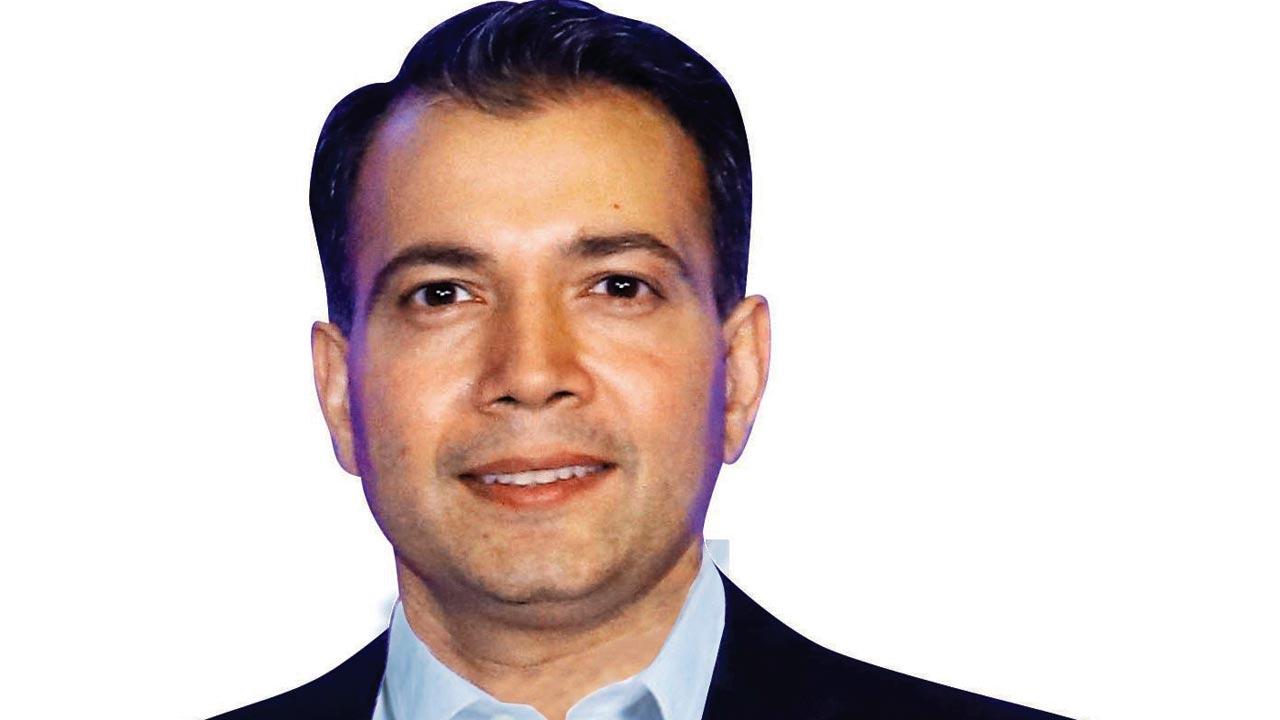Host, humourist and food enthusiast Kunal Vijaykar has lost 20 kg in six months, not by exercising or dieting, but through computer interface technology that claims to help train the subconscious brain

The proof lies in the pudding. Pre and post weight loss photographs of Vijaykar
I had always been stout—to use a kind word—but during the lockdown, I knew I had to make a change.” Kunal Vijaykar is trying to recall his moment of truth for us when we ring him up to discuss his incredible weight loss success. In six months, Vijaykar, who knows his food as much as he loves it, has gone down from 106 kg to 86 kg. He admits that he realised during moments of quietude that the isolation of the pandemic afforded us all, that eating had turned into an obsession. “I used to wake up and start thinking, what will I eat for breakfast. Before breakfast was even done, I was already thinking about what I would snack on later. I succumbed to my natural desire for food, which is quite obsessive. And people were sending me grub over as well. So, here I was, sitting at home, not in the greatest state of mind since I live alone. And slipping into my comfort zone because it’s food that makes me happy.” That Vijaykar has made a name for himself reviewing eateries, trying and tasting fare by upcoming home chefs, didn’t help. “I just bloated, and I hit it out of the park!” says the television host, humourist, writer and foodie.
But the turning point came when he felt that things were getting “slower and slower”. “Till you decide you want to do something, you won’t do it. I am hedonistic! I have never even gone to the gym. My lifestyle had become an addiction—my food intake, my laziness. I am 57, I’ve joined the gym six times, and never gone,” says Vijaykar.
 Kumaar Bagrodia, founder, NeuroLeap
Kumaar Bagrodia, founder, NeuroLeap
He hadn’t known then that help was just one friend away. Kumaar Bagrodia, Vijaykar’s friend and founder-CEO of NeuroLeap, established the firm in 2017, and calls it India’s leading applied neuroscience company. He explains that they leverage a brain-computer interface technology to understand the human brain and help it work at optimal potential based on the principles of neuroplasticity, and self-regulation. “Kumaar had discussed the benefits of this method with me many times, and maybe I had resisted it. But there is no electricity involved, no medication and it’s non-invasive [and that helped],” Vijaykar recalls, adding that he was also keen to address his mental downer. The lockdown, he felt, had allowed a mild depression to creep in. He had begun to turn to sleeping pills. “My executive skills were hampered—I wasn’t motivated enough to do things.”
He decided to finally take up Bagrodia’s offer in a bid to regain control of his executive decision-making skills, and in the process, lose weight. Bagrodia says they have two sets of clients—people who just want to optimise their brain function and have better energy levels and get better sleep. “Others have mood disorders, sleep issues, depression, addiction. We also get children with ADHD,” says Bagrodia. An assessment at NeuroLeap costs Rs 25,000 which includes a detailed report and consultation. And each session after, costs Rs 10,000.
Bagrodia takes the example of his friend to explain what NeuroLeap does. “We first conduct the NeuroLeap Brain Function Assessment. We place sensors on an individual’s head, so we can track their subconscious brain waves. It’s like when you do an ECG and sensors are fixed over your chest. Kunal wore that sensor headband and sat in a chair with his eyes shut. We mapped the brain once every 31 milliseconds. One millisecond is a 1,000th of a second, so it would be eight times in an eye-blink. Before you consciously know what’s going on, your brain has been mapped. We create a detailed report to analyse the mental state, but we don’t use terms like depression or addiction. We figure out how the various parts of the brain are working and interacting with each other.”
Vijaykar’s report came back with indications that Bagrodia says are common with super achievers with an artistic temperament. “His passion was now an obsession. His executive function network, which controls how he takes an action, and his ability to make decisions that are good for him, were a bit off. His
sleep was also affected.”
Once they had the data, they created a programme customised for Vijaykar, like they do for each client. “In the next session what happens is that he sits in the same chair and he wears the same sensors. But now we tell him, we aren’t just mapping his mind, we are rewarding it. The rewards are in the form of a light or sound played on a TV. The more often it is played, you realise your subconscious brain is being rewarded. So that awareness, is actually the reward. In therapy, the reward is a conscious one, here it’s a subconscious one. The maximum you can get is 1,800 rewards in 30 minutes. So, it’s about training your subconscious brain, which is basically the one that makes decisions for you. For Kunal, we had to make it work in such a way that his passion [to appreciate and enjoy food] still thrived, but he was learning how to control it.”
Vijayakar, who has now launched a weight loss programme with NeuroLeap, says he realised his attempts to self-regulate were working when he saw a samosa and was able to stop himself. He was no longer feeling unhappy at saying no to the samosa. Instead of having two at a go, he was choosing to have one. “I also gradually cut down my sleeping pill dose from full to quarter to nothing. Something was supporting my mind and my ability to control my actions.”
The effort is showing up in tangible ways. Six months and 20 kgs lighter. “I have done it [control appetite and lose weight] the logical way. I have stopped having roti and white bread, and adopted rice into my diet. I also walk every day.”
 Subscribe today by clicking the link and stay updated with the latest news!" Click here!
Subscribe today by clicking the link and stay updated with the latest news!" Click here!








